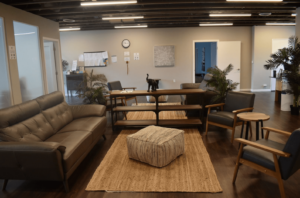While you may have navigated the holiday season with success — and we congratulate you on this impressive accomplishment — now’s not the time to let your guard down.
Here at Tres Vistas, Dr. Daniel Headrick and our team of recovery experts are invested in your success, which is why we’ve pulled together 10 great relapse prevention tips for you to consider in the new year.
1. Stay connected
As we mentioned, your success means everything to us, which is why we provide aftercare services geared toward alumni. These services include weekly alumni meetings and an online alumni blog where you can share experiences and keep track of the friends you made in early recovery.
We urge you to stay connected through our aftercare so that you can take inspiration from others, as well as be a source of inspiration.
2. Build a support network
Aside from staying connected to Tres Vistas, we recommend that you create your own support network. Whether it’s through 12-step groups or friends and family who understand recovery, this network is invaluable for keeping you on your recovery track.
3. Use your phone
You’ve likely heard this before, but if you’re at all feeling like you want to pick up again, use the phone and give someone in your support network a call. This split-second decision to call someone can help prevent a relapse that might undo all of your great efforts.
4. Be of service
There’s a good reason why service is one of the pillars upon which Alcoholics Anonymous is built — helping someone in need provides you with perspective and gets you “out of yourself.” Whether you volunteer at a soup kitchen once a week or walk animals at a local shelter, being of service can be incredibly rewarding.
5. Pick up new activities
In recovery, you have the ability to create a life that better caters to your sobriety, which means you can try new things. We urge you to pick up a new hobby or activity, which will not only occupy your time, but give you a feeling of satisfaction that you’re able to learn something new.
6. Take your medications
If you’re taking medications to support your recovery and prevent relapse, such as Suboxone® or naltrexone, please make sure that you keep up with these medications.
7. Manage stress
While relapse can occur for many reasons — you’re happy, you’re sad, you’re angry — stress is something that you want to escape. Instead of turning to drugs or alcohol, why not combat stress in other ways, such as deep breathing, meditation, sports, hikes, or whatever else that relaxes you?
8. Identify risk
One of the keys to avoiding relapse is to understand and identify your triggers — those people, places, and things that lead to undesirable thoughts and cravings. Take the time to recognize when you have a thought or craving and look around you to see what triggered it so that you can avoid (or better prepare for) the circumstances down the road.
9. Have a plan
There are likely going to be times when you’re faced with people who are using your substance of choice, so you should have a plan in place. Perhaps you leave a party early or come armed with your own beverages. The bottom line is that you should have a strategy for navigating these tricky waters and stick to it.
10. Be kind to yourself
We want you to know that we’re very proud of you for making it into recovery and you should be, too. Resist being hard on yourself and practice the same kindness toward yourself that you would practice toward others in the same position.
If you would like more ideas for preventing relapse, please contact our office in San Juan Capistrano, California.














